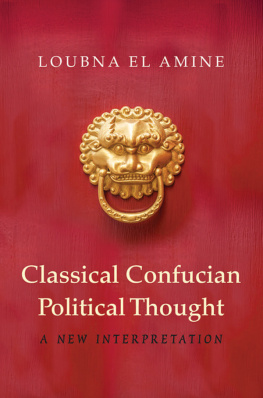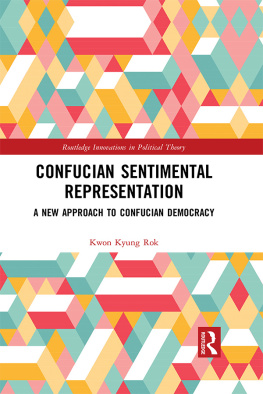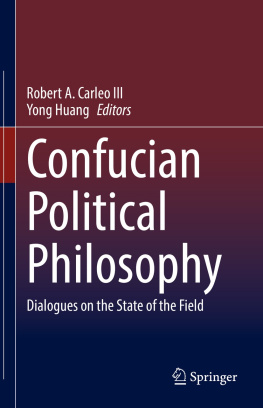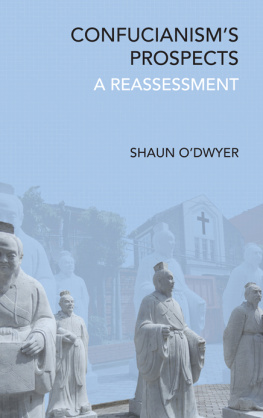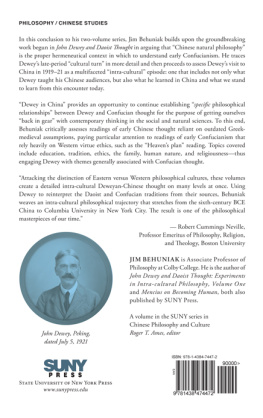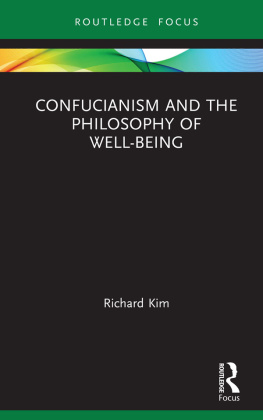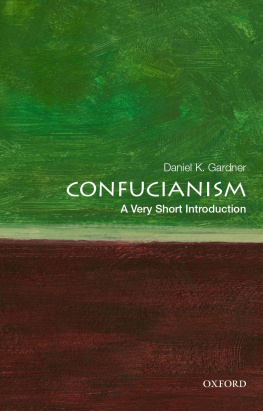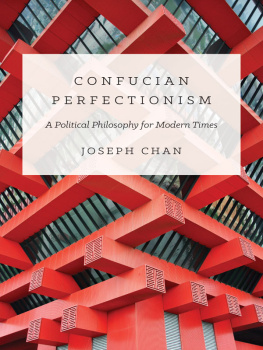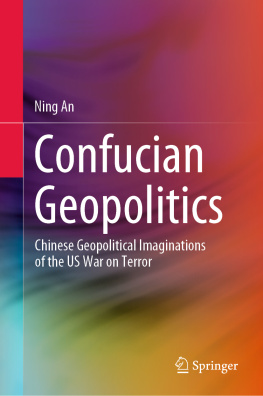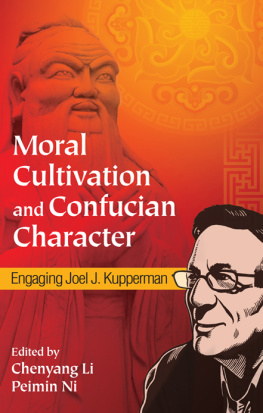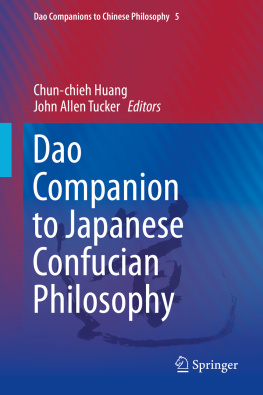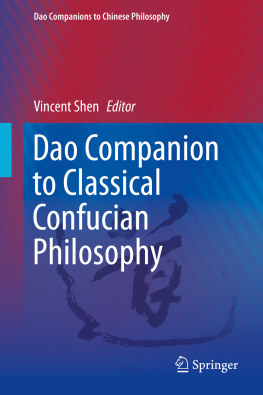
Classical Confucian Political Thought

Classical Confucian Political Thought

A NEW INTERPRETATION
Loubna El Amine
PRINCETON UNIVERSITY PRESS
PRINCETON AND OXFORD
Copyright 2015 by Princeton University Press
Published by Princeton University Press, 41 William Street,
Princeton, New Jersey 08540
In the United Kingdom: Princeton University Press, 6 Oxford Street,
Woodstock, Oxfordshire OX20 1TW
press.princeton.edu
Jacket Photograph: Ancient Chinese door knocker, located in
Temple of Confucius, Harbin City, Heilongjiang Province, China.
aphotostory/Shutterstock
All Rights Reserved
Library of Congress Cataloging-in-Publication Data
El Amine, Loubna, 1983
Classical Confucian political thought : A new
interpretation / Loubna El Amine.
pages cm
Includes bibliographical references and index.
ISBN 978-0-691-16304-8 (hardcover : alk. paper) 1. Confucianism
and state. 2. Philosophy, Confucian. 3. Confucian ethics.
4. Political ethics. I. Title.
BL1840.E5 2015
320.0931dc23
2015000234
British Library Cataloging-in-Publication Data is available
This book has been composed in Palatino
Printed on acid-free paper.
Printed in the United States of America
1 3 5 7 9 10 8 6 4 2
For my parents
Adnan El Amine and Fadia Hoteit

Contents

Acknowledgments

T here is an old Arabic saying, sometimes attributed to the Prophet Muhammad, that goes, Seek knowledge, even in China. The idea of China as a farawaythe furthest awayland had not completely disappeared from the social imagination in the Arab world by the time I was an undergraduate. That I ended up writing a book on Chinas central intellectual tradition was the result of an unexpected journey that started with my professor and mentor at the American University of Beirut, Yahya Sadowski. He encouraged his students to think about the Arab world comparatively, often using East Asia as an example. When I started graduate studies at Indiana University, Bloomington, it was Robert Enos class on Classical Chinese philosophy that introduced me to Confucianism, with which I have stayed since.
This book is based on my dissertation work at the Department of Politics at Princeton University and I cannot sufficiently express my gratitude to my advisors. Charles Beitz and Alan Patten encouraged this project from its inception, providing continuous help and meticulous feedback. Neither my background nor my research interests were typical, and they, and the Princeton political theory program more generally, were never anything but supportive. Willard Peterson open-heartedly gave up much of his time to make sure that I was adequately versed in Chinese history. Stephen Angles mentorship, both through the example of his own work in Chinese philosophy and through his tireless commentary on my chapters, was crucial. His characteristic generosity also extended to seeing me through the ups and downs of academic life.
I have received more feedback in the process of writing this book than I can adequately recognize here. I especially wish to thank Aaron Stalnaker and David Wong for reading and commenting on the whole manuscript. Stalnaker gave especially thorough feedback. Thanks are also due to three anonymous reviewers. I am grateful to Tongdong Bai, Daniel Bell, Joseph Chan, Jeffrey Isaac, Leigh Jenco, the late Iliya Harik, Martin Kern, Melissa Lane, Stephen Macedo, Michael Nylan, Kwong-loi Shun, Melissa Williams, and Yang Xiao for very helpful discussions and pointers along the way. For reading and commenting on particular chapters, I wish to thank Carlo Invernizzi Accetti, Karuna Mantena, Ryan Nichols, and Bernardo Zacka. Mick Hunter has always graciously answered all my questions and requests for help with early Chinese history and Classical Chinese grammar. Sandra Field and Genevive Rousselire read various parts of the project at different stages and their feedback was particularly helpful, imbued as it was with precious friendship.
I have greatly benefited in working on this book from a two-year Mellon postdoctoral fellowship at the Whitney Humanities Center at Yale University. I have also received support from the Princeton University Center for Human Values, and the Princeton Institute for International and Regional Studies. Thanks are also due to Xu Xiangdong for the affiliation with Peking University during the fall of 2009. Last but not least, I wish to thank my new institutional home, the Department of Government at Georgetown University, as well as the Berkley Center for Religion, Peace & World Affairs, for their support.
My editor at Princeton University Press, Rob Tempio, appreciated my project from the first time I met him, and it has been a pleasure working with him since. I also wish to thank Nathan Carr, Ryan Mulligan, and the rest of the staff at PUP for their conscientious work on this book, as well as Maria DenBoer and Jingcai Ying for indexing and proofreading. Kevin Mazur read the whole book in its very last stage and prevented a few awkward locutions from making it into the final version. I am sure this would have been a better book had he had the chance to read it earlier.
I sometimes wonder, given the centrality of family to Confucian thought, whether I would have been drawn to it in the same way I was, ten years ago, had I not grown up in a happy family. My brothers Mehdi and Ramzy both react to the world with a healthy dose of humor and bon sens, gently tugging at me when I get too tied up in the throes of academia. My parents are both academics; we were raised amongst books, and dinner conversations at home always involved intellectual, political, and ethical issues. But seriousness was also balanced with light-heartedness, and combined with a freedom for each of us to choose our own way in the world. This book is dedicated to my parents who made it all possible.
Note on Translations and Transliterations

U nless otherwise indicated, I have quoted from Confucius, The Analects, trans. D. C. Lau (London: Penguin, 1979) for all translations from the Analects. I have also consulted Confucius, Confucius: Analects with Selections from Traditional Commentaries, trans. Edward Slingerland (Indianapolis: Hackett, 2003). Chapter and section numbers follow Lau. For the Mencius, I have quoted, unless otherwise indicated, from Mencius, Mencius, trans. D. C. Lau (rev. ed.; London: Penguin, 2003), and consulted Mencius, Mengzi: With Selections from Traditional Commentaries, trans. Bryan Van Norden (Indianapolis: Hackett, 2008). Chapter and section numbers follow Lau. For the Xunzi, I have quoted, unless otherwise indicated, from Xunzi, Xunzi: A Translation and Study of the Complete Works, 3 vols., trans. John Knoblock (Stanford: Stanford University Press, 198894), and consulted Xunzi, Xunzi: Basic Writings, trans. Burton Watson (New York: Columbia University Press, 2003). Chapter and section numbers follow Knoblock.
I have adopted the Hanyu Pinyin system for the romanization of Chinese characters throughout except for proper names that are predominantly romanized according to the Wade-Giles system in English-language texts.
Next page
